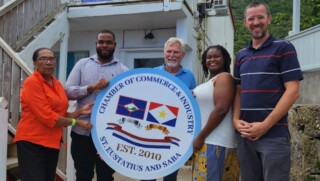Council for Law Enforcement critical of the fight against corruption in the Caribbean Netherlands
KRALENDIJK, The Law Enforcement Council (Raad voor de Rechtshandhaving) is critical of the fight against corruption in the Caribbean Netherlands, especially on Bonaire, and wants governments to pay more attention to a number of elements, in view of the identified risks.
The Council has examined how its recommendations from the 2015 report, ‘Infrastructure Combating Corruption on Bonaire, St. Eustatius and Saba’, have been followed up in recent years.
The report examines the nature and extent of official corruption and the development of the integrity policy of the public entities Bonaire, Sint Eustatius and Saba. The integrity policy should have a preventive effect in order to prevent corruption. The Board has also identified the extent to which the focus is on the follow-up to the recommendations from the previous report. For example by the Ministry of Justice and Security (JenV). The Council made a number of findings.
Approach
The public entities Bonaire, Sint Eustatius and Saba are, each in their own way, engaged in the development of the integrity policy. Steps have been taken in this regard. However, the Board also identifies various integrity risks that are of great concern. Such as the lack of clear rules and policies regarding the issuance of land on Bonaire. The National Criminal Investigation Department already made concrete recommendations in 2018 to establish clear rules and policy regarding the issuance of land. More than four years later, this has still not been achieved on Bonaire. As a result, there are still risks of self-enrichment, arbitrariness and unethical behaviour. The integrity office established within the public body Bonaire experiences opposition and insufficient support to carry out their tasks. Reporting abuses, unethical behavior, is not encouraged and even counteracted.
Theme Register
In order to gain a better insight into the nature and extent of official corruption, data about this can be processed in a so-called theme register. This would also be possible for the Caribbean Netherlands as of 1 January 2020. The Minister of Justice and Security has promised this to the House of Representatives. However, the Council notes that this is not allowed for the Caribbean Netherlands due to an error in the legislative process at the Ministry of Justice and Security. As a result, there is unfortunately still no question of building up a structured information position for the purpose of detecting official corruption. Precious time has been lost as a result.
The Board’s investigation does show that the permanent occupation of the National Criminal Investigation Service in the Caribbean Netherlands, based in Bonaire, also contributes to gaining insight into the nature and extent of official corruption.
Bibob Law
The investigation also shows that insufficient progress has been made in the so-called Bibob pilot (Promoting integrity assessments by public administration), which has been running for years. The lack of a Bibob variant hinders the resilience of local government and increasingly entails money laundering risks, especially on Bonaire. Moreover, this damages the public’s trust in the government.
Recommendations
The Council is now making various recommendations to the Dutch Minister of Justice and Security. For example, management by the Ministries of Justice and Security and of the Interior and Kingdom Relations (BZK) should be improved.
Both the Minister of Justice and Security and the Minister of the Interior and Kingdom Relations indicated in their response to the report that they endorse this and have taken up that guiding role. From now on, periodic consultations will take place with the organizations involved. The necessary legislative amendment for theme processing in the Caribbean Netherlands will not be implemented until January 1, 2024.
The Ministry of the Interior and Kingdom Relations will support the public entities where necessary and possible in the design and implementation of the integrity policy. The ministers also indicate that in the spring of 2023 they will inform the House of Representatives in more detail about the state of affairs with regard to the follow-up to the Council’s recommendations.
The minister sent the Council’s report together with his response to it to the House of Representatives. The Council’s inspection report and the minister’s response to it are public. Both are posted on the Council’s website: www.raadrechtshandhaving.com











